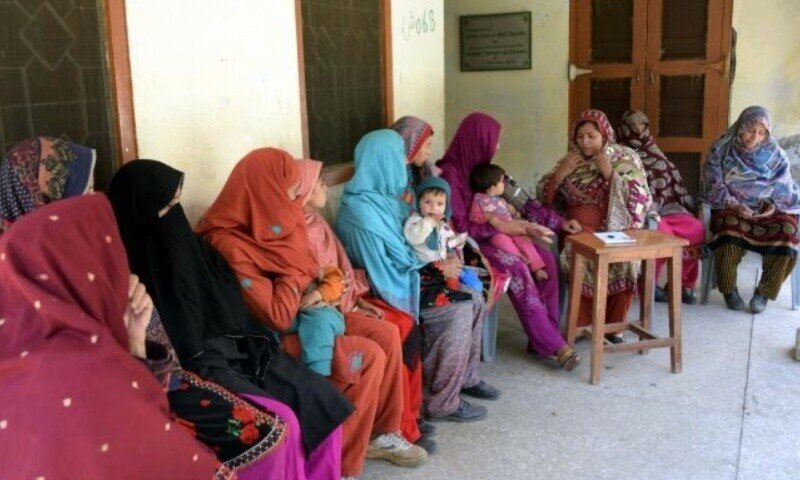The Gates Foundation announced on Monday it will invest $2.5 billion in women’s health globally by 2030, with Pakistan among the countries set to benefit from work in maternal health, nutrition, contraception, and related areas.
Research and development (R&D) in women’s health remains chronically underfunded worldwide, with limited investment in areas like gynaecological and menstrual health, obstetric care, contraception, sexually transmitted infections, and maternal nutrition, the foundation said in a statement.
Citing a 2021 McKinsey & Company analysis, it said just one per cent of healthcare R&D targets female-specific conditions beyond cancer. Common issues like preeclampsia, endometriosis, and menopause remain largely overlooked despite affecting hundreds of millions.
“Investing in women’s health has a lasting impact across generations. It leads to healthier families, stronger economies, and a more just world,” said Bill Gates, chair of the Gates Foundation. “Yet women’s health continues to be ignored, underfunded, and sidelined. Too many women still die from preventable causes or live in poor health. That must change. But we can’t do it alone.”
Speaking about pregnancy-related complications globally, Gates said the topic remained vastly under-studied. He made the remarks at Women’s Health, Unstuck, a Tuesday morning event organised by digital media company STAT at the Broad Institute of MIT and Harvard, Massachusetts, where he joined global health experts to discuss breaking barriers in women’s health before a live and virtual audience.
“Giving birth is still … very risky, particularly in low-income countries. Even conditions like preeclampsia and gestational diabetes aren’t as well understood [in] the rich world as they should be.
Discussing the decision to invest in women’s health, Gates said the foundation had made significant progress in reducing child mortality by 50pc since 2000, but maternal deaths have only dropped by 20pc to 25pc.
“So, the team looked into causes of maternal deaths. We shifted resources to high-impact areas as we gained insights into the burden of disease.”
He said while conditions like postpartum haemorrhage have seen progress, “nobody else was funding issues such as anaemia, improving the HPV (human papillomavirus) vaccine, and nutrition.”
Closing innovation gap in women’s health
Pointing out the pressing need to address the innovation gap in women’s health, Dr Anita Zaidi, President of the Gender Equality Division at the Gates Foundation, emphasised the long-standing exclusion of women from medical research and its impact on health outcomes.
“…When women are left out of research, they are left out of solutions,” she said. “Here in the US, women were not even routinely included in clinical trials until 1993. And 90pc of the medications that we use today have never been tested in pregnancy.”
She called for urgent change: “Millions of women [are] being misdiagnosed, ignored, or misunderstood. Closing the innovation gap in women’s health is not just overdue. It’s essential.”
Shedding light on the transformative potential of new technologies in women’s health, Dr Zaidi stressed the urgency of greater investment.
“These include low-cost AI-enabled ultrasounds, low-cost tools for safer births, such as sensors, and next-generation contraceptives designed for women’s needs. This is why, earlier today, the Foundation announced $2.5bn through 2030 to support innovation in women’s health,” she said.
Acknowledging the significance of the commitment, she said that it was only a starting point: “Yes, it sounds like a big number. And it is a big number. But given the need, it’s just a drop in the bucket.”
Dr Zaidi urged other funders to act, adding: “We need the investment and the commitment from others to make sure these innovations reach the women who need them.”
High burden of disease in Pakistani women
Although the Gates Foundation frames the initiative as global, most projects target health innovations in low- and middle-income countries — including Pakistan — where the needs are most urgent.
When asked what the new fund meant for women’s health in Pakistan, Dr Zaidi — who previously worked at Aga Khan University — told Dawn in a separate comment: “Pakistan is one of the Gates Foundation’s priority countries because of the high burden of disease among women and children.”
She recalled her experience as a practitioner in Pakistan, saying, “I would see children come in with their health problems or malnutrition and I would be telling the mother … to breastfeed properly to take care of the infant, but then I would look at the mother and I’d say ‘Oh my God, her own health is so poor, who is looking after her health, why is her health not important’.”
She added, “A lot of the problems that we were seeing in the babies were actually problems in the mother’s health. Without addressing the mother’s health, it was not possible to address the children’s health.”
Highlighting the crisis, she said, “Newborn mortality in Pakistan, where one out of 25 babies dies in the first month of life, is the highest in the world, and that is because of the neglect of women’s health.”
At present, the foundation is supporting a range of women’s health initiatives in Pakistan, with an emphasis on family planning, maternal health, and reproductive rights. It has committed over $2 million to Shirkat Gah Women’s Resource Centre in Lahore to strengthen community-led advocacy and expand access to family planning services.
The foundation is also partnering with the Benazir Income Support Programme (BISP) to improve maternal and child health through the Nashonuma cash transfer initiative, which addresses nutrition, health awareness, and access to essential services.
A $12.5m grant has been awarded to the University of Manitoba in Canada by the foundation for research into barriers to maternal and newborn care in regions, including Sindh.
In addition, the foundation is backing innovation through projects like Awaaz-e-Sehat, an AI-powered mobile tool developed at the Lahore University of Management Sciences (Lums) to help women record and access maternal health information via voice technology.
On the foundation’s local partnerships, she said, “From the Gates Foundation perspective, we have been working in Pakistan for a long time… many of these innovations are also locally informed by research, which is done locally with our partners and many civil society organisations and academic institutions.”
Despite the foundation’s work in the country, she emphasised that it was ultimately up to Pakistanis to change the reality that women face, and that it was the responsibility of the government and society to implement good policies to transform women’s lives.
“Without recognising that women should be at the heart of the development agenda, Pakistan will not prosper,” she stressed. “Pakistan will not prosper without recognising that women’s development has to be central to the country’s development.”
Five priority areas to improve women’s health
The foundation’s $2.5bn commitment will target innovation across five critical areas of a woman’s life, according to the statement. They include:
- Obstetric care and maternal immunisation: Making pregnancy and delivery safer
- Maternal health and nutrition: Supporting healthier pregnancies and newborns
- Gynaecological and menstrual health: Advancing tools and research to better diagnose
treat, and improve gynecological health and reduce infection risk - Contraceptive innovation: Offering more accessible, acceptable, and effective options
- Sexually transmitted infections (STIs): Improving diagnosis and treatment to reduce disproportionate burdens on women
Breakthrough opportunities include research on the vaginal microbiome, new treatments for preeclampsia, and non-hormonal contraception. The investment also covers data generation and advocacy efforts to ensure product adoption and real-world impact.
“The five priority areas were selected based on a combination of data and evidence about where innovation can save and improve the most lives, direct insights from women in low- and middle-income countries about their needs and preferences, and the persistently high rates of misdiagnosis caused by gaps in medical knowledge and training,” it said.
“They also reflect the unique challenges faced in low-resource settings, making these areas especially ripe for broader public and private investment to drive meaningful, scalable impact.”
Innovations funded under commitment
The foundation provided a list of more than 40 existing projects it has funded that could fall under the commitment. They range from the very low-tech to the extremely high-tech. For instance, a simple, low-cost plastic drape — think of a V-shaped plastic bag — that can be placed under a patient during childbirth to collect lost blood. Markings in the bags allow health care providers to rapidly identify when there is too much maternal blood loss.
The foundation was also funding the most expensive type of project in health care — the creation of new medicines.
Comanche CEO Scott Johnson, who spoke on a panel at the event, said the focus on maternal health in the US had made a difference. He said, “I think we’re considering women’s health more as public. As one of my board members said to me, women are not a special population, they’re half the population.”
He continued: “We need more successes. Success attracts capital and interest. And we’ve had too many efforts, at least in the pharmaceutical industry and drug development, to simply repurpose drugs.”
Johnson also told STAT News that although funding was incredibly important, the Gates Foundation’s resources were great. “They have biostatisticians, drug modellers, lawyers who understand regulatory challenges in third world countries and can help you figure out how to do a clinical trial in Ghana. They have enormous and useful resources.”
In exchange for the foundation’s support, Johnson explained, his company agreed to a provision: if it fails to develop the drug for low- and middle-income countries, the foundation will gain access to its intellectual property, allowing it to ensure the product reaches those markets. He acknowledged this arrangement might raise concerns among potential venture capitalists or pharmaceutical partners, according to the outlet.
Even so, Johnson emphasised that both Comanche and the foundation shared the goal of making the drug widely accessible. “We’ve got to be able to find a way to deliver this drug in these countries or it’s not going to achieve its full value, and I mean its full societal value,” he said.
Call for broader support beyond foundation funding
Gates pointed out that in areas like malaria, tuberculosis, and non-hormonal contraception, the foundation was already among the largest funders globally. While R&D projects will continue under Gates Foundation support, he made it clear that funding for service delivery is not permanent — long-term success depends on other players stepping in.
Despite his personal wealth, Gates acknowledged the foundation’s limitations.
“We’d love to have other people work on this stuff,” Gates said. “It’s crazy that this stuff isn’t better funded. Drawing governments and other philanthropists in — we’ve had some success at that, and I’m putting more time into talking with other philanthropists about how impactful this work is. So I think we’ll have a lot of additional partnerships, certainly at the end of the 20 years.
“Then we’re gone, and so other people will have to step up in these areas.”








